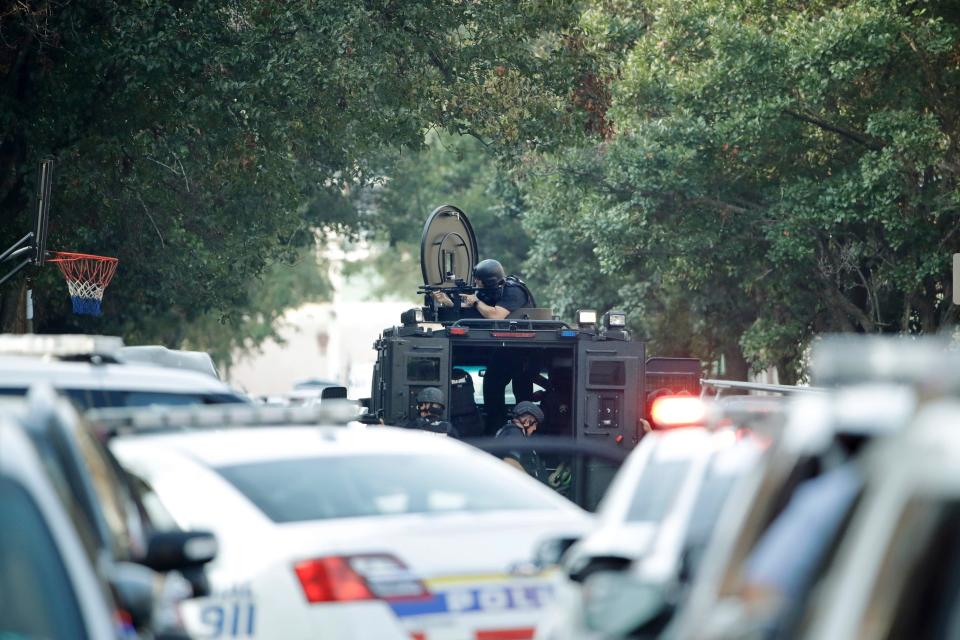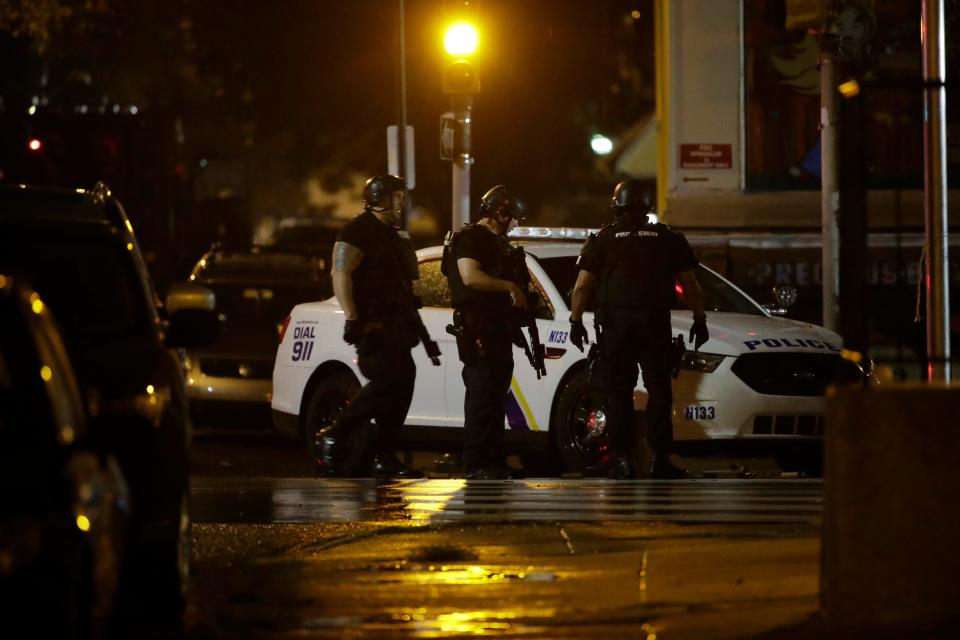Frustrated Philadelphia mayor calls for gun control. Here's why it hasn't happened in his city.
As the standoff between a man wielding an assault-style rifle and Philadelphia officers unfolded Wednesday night, Mayor Jim Kenney huddled at police headquarters and listened to round after round of gunfire crackle over the radios.
Hours later, as police continued to negotiate with the shooter, he wondered how one man with a lengthy criminal record could get his hands on so much firepower.
“Our officers deserve to be protected and they don’t deserve to be shot at by a guy, for hours, with an unlimited supply of weapons and an unlimited supply of bullets,” Kenney said to reporters, frustration building in his voice. “It’s disgusting. And we’ve got to do something about it.”
But Kenney is mostly powerless when it comes to regulating guns in Philadelphia, even though he’s the top elected official in America’s sixth most populous city.
A Pennsylvania law bans local municipalities from enacting gun control measures that are more strict than those adopted by the state. Philadelphia politicians are far from alone. More than 40 states have passed similar so-called “preemption laws,” which have become a powerful tool of the National Rifle Association and other pro-gun groups looking to tamp down gun control efforts.

A few weeks before Wednesday’s shooting in Philadelphia, city officials proposed banning guns in city parks and recreation centers following two shootings this summer that left more than a dozen people wounded and one dead. That legislation would only be enforceable if legislators in the Republican-controlled statehouse passed a companion law clearing the way.
Kenney, at a Thursday news conference, pleaded with state and federal lawmakers to “step up or step aside” and let Philadelphia pass local laws.
“Help our police officers. Help our clergy. Help our kids,” said Kenney, whose city saw a 12 percent increase in homicides from 2017 to 2018. “And if you chose not to help us, then get out of the way and allow cities like Philadelphia that struggle with gun violence to enact our own solutions.”
On the other side of the state, officials in Pittsburgh this year responded to the October 2018 mass shooting at the Tree of Life synagogue by passing three gun reform bills, including a ban on assault-style weapons, in open defiance of the state preemption. The laws are being challenged in court, and the city has agreed to not enforce them in the interim.

As the two Pennsylvania mayors push back on the law, momentum in the GOP-controlled statehouse seems to be moving in the opposite direction. Two bills that would only strengthen the state’s preemption were introduced this year.
Pennsylvania Rep. Mark Keller, a Republican, introduced a bill that would allow individuals who sue over local gun laws to recoup attorney fees. Keller said shootings like the one in Philadelphia won't be avoided by allowing cities to pass their own regulations.
“People that are going to do harm to other people don’t care about the law,” he said.
Shira Goodman, executive director of CeaseFire PA, a gun-control advocacy group, expressed frustration that even banning firearms from municipal buildings — something possible in Philadelphia and Pittsburgh because their respective city halls also house courthouses — is blocked in much of Pennsylvania. In November, a man with a gun walked into the municipal offices in Paradise Township, about two hours north of Philadelphia, and fatally shot a city employee.
“Every time Philadelphia or Pittsburgh or any city in between has tried to take action to make its city safe, the state has said: ‘No. And by the way we’re not going to do anything either,’” Goodman said.
Advocates of preemption laws say they keep states from becoming a patchwork of competing gun laws. The NRA, in its defense of the laws, said without preemption, gun owners could be “at risk of violating an ordinance of which they were not previously aware, as they travel within their states.”
State legislators also use preemption laws to control local policies surrounding minimum wage, paid sick leave and even plastic bags. But when it comes to firearms, tensions over the policies are heightened.
In Kentucky, officials can be prosecuted criminally and face jail time for voting on gun ordinances that compete with the state’s own policy.
In the wake of last month’s shooting in Dayton, Ohio, which left nine people dead, gun-control advocates pointed to the fact that the city once had a ban on assault-style weapons like the firearm used in the shooting. It was pulled from the books by a 2006 state preemption law.
Arizona’s preemption law, proposed by Republican Gov. Doug Ducey in 2016 and passed by the GOP-dominated legislature, prevents local governments from enacting any policies that are more restrictive than what the state allows. Described as “the mother of all local preemption bills,” the law allows the state to withhold shared income tax revenue from municipalities in defiance.
The law forced Tucson, Ariz. officials to stop enforcing a 12-year-old policy of destroying confiscated guns. State law requires the weapons be sold.
“We’re in a straight jacket,” Tucson City Councilman Steve Kozachik said. The state’s pre-emption law “absolutely strait jackets us from a gun-safety standpoint of what we can do in this city.”
Pennsylvania’s firearm preemption debate dates back to 1993, when officials in Philadelphia and Pittsburgh passed a ban on assault-style weapons, prompting the state legislature to repeal the laws. The state Supreme Court ruled against the cities. In 2008, after Philadelphia officials had passed a handful of new gun control measures, the state court stepped in again, ruling them invalid.
In 2015, the justices swung the other way by striking down a law that allowed pro-gun groups like the NRA to sue local municipalities over their local gun laws and recoup attorney fees from taxpayers. Their ruling was based on a technicality over how the law was passed, not the underlying issue, which has paved the way for lawmakers like Keller to give similar regulations a second try. In the months that the law was in effect, scores of municipalities across the state scrambled to repeal their gun laws, fearing liability.
A similar battle is underway in Florida, where last month a judge ruled against a state law that allows local officials to be fined or even removed from office for enacting gun control measures. The state has appealed the decision.
Nestor Davidson, a Fordham University law professor who studies state and local governments, said there are signs that the public is starting to think preemption laws, in general, “have tipped too far in one direction.” He cited Colorado as an example where lawmakers recently repealed its preemption blocking municipalities from setting minimum wages. He said he has not seen that movement materialize in the debate over gun preemption laws but noted that the political landscape around gun control is “changing pretty rapidly.”
“If the larger political culture shifts,” he said, “I won’t be surprised to see if – as in Florida – the pushback does materialize in a way where, whether it’s through litigation or legislation, you are going to see the balance shift.”
Mary Jo Pitzl contributed to this story.
This article originally appeared on USA TODAY: Philadelphia Mayor Jim Kenney wants gun control after shootout

